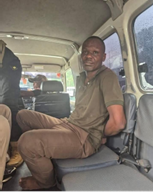Article: Living a Prudent Life
-The Path to a Better Liberia and a Lasting Legacy

By: Austin S Fallah – A True Son of Liberia, Africa and the Planet Earth Soil:
The virtue of prudence, the ability to govern and discipline oneself through the use of reason, holds a central place in the quest for personal excellence and societal progression.
In Liberia, a country emerging from the shadows of tumultuous periods in history, the call for its leaders to embody this cardinal virtue is not just timely but exigent.
Liberia stands at a crossroads where the decisions of today’s generation possess the monumental power to dictate the nation’s trajectory for better or for worse.
As Liberian leaders caution, by embracing prudence and its implications for governance and personal conduct, Liberian leaders pave the way for a thriving nation and ensure that Liberia’s legacy the tangible future bestowed upon the nation’s children is one of promise and abundance.
The echoes of Liberia’s past, with its scars of civil unrest and political upheaval, are still heard in the conversations and decisions of today’s leaders.
The imperative to live a prudent life extends from the individual to the collective, saturating the ethos of political, economic, and societal frameworks.
Prudence in leadership speaks to the necessity for sober reflection, careful planning, and discerning judgment.
It demands that decisions be made not on the wings of transient emotional responses or for personal aggrandizement but aligned with an unwavering commitment to the public good.
A clear-eyed evaluation of Liberia’s needs underscores the areas in which prudence must be exacted, governance that is transparent and accountable, economic policies that are sustainable and inclusive, and healthcare and educational systems that are accessible and robust enough to withstand the pressures of an evolving global landscape.
In this, the cultivation of character among leaders is not merely desirable but indispensable.
It is the wellspring from which good governance can flow.
The principles of prudent living take on added dimensions when applied to the stewardship of a nation’s resources.
Natural, human, and financial resources are the lifeblood of a nation’s development, and their management requires a long-term outlook informed by expertise, ethical considerations, and the well-being of future generations.
In Liberia, stewarding natural resources like its lush forests, rich mineral deposits, and fertile agricultural lands calls for a blend of prudence and innovation.
A deliberate approach towards these resources, wherein their exploitation is balanced with conservation and regeneration efforts, ensures that economic benefits do not come at the expense of environmental sustainability or the rights of local communities.
Financial prudence is just as critical. The planning and execution of public finances, including foreign aid, must adhere to principles that discourage waste and corruption.
Investments should prioritize infrastructure, education, and healthcare building blocks for a robust society that would foster self-reliance and dramatically reduce dependency on external actors.
The responsibility of today’s leaders also requires them to consider the spiritual and moral legacy they leave behind.
A legacy comprised solely of material wealth or infrastructure, while valuable, is incomplete without the underpinnings of ethical values and virtues.
Prudent living, by its nature, fosters the development of character, a narrative of dedication, honesty, and integrity that can animate future generations.
Educating the Liberian younger population on the ideals of financial literacy, civic responsibility, and ethical leadership from an early age implants the seeds of prudence in fertile soil.
Programs that foster youth engagement in politics and economics can help to build a cadre of future leaders who regard prudence as an indispensable tool in their leadership repertoire.
A defining marker of their resolve to contribute meaningfully to society.
Furthermore, creating opportunities for intergenerational dialogue and knowledge transfer can inculcate the values of foresight and measured approach necessary for sustainable progress.
The stories of the struggles and victories of today can become the blueprint for the children of tomorrow, guiding them as they tread their paths and make their mark on the world.
The demand for prudent leadership and the immediacy of the resultant benefits cannot be underestimated, especially in a post-war context like Liberia’s.
With the challenges of reconciliation, healing, and rebuilding, the country requires an acceleration of prudent decision-making at all levels.
It entails making hard decisions, potentially unpopular ones, that are nonetheless grounded in the long-term well-being of the nation.
It means investing in systems that may take years to yield results, like education reform, which can fundamentally change the course of the country by creating a skilled workforce ready to innovate and propel Liberia forward.
It requires striking a balance between the satisfaction of immediate public demands and the assurance of future prosperity.
Delaying the implementation of prudent measures only exacerbates the difficulties, deepens the chasms of inequality, and postpones the prospects of stability and growth.
Let me use this korero to send a clarion cry for prudential living within the Liberian leadership.
It is not just a caution but an urgent directive toward establishing a legacy of prosperity and integrity for the nation’s children.
It calls stakeholders to the higher ground of foresight, accountability, and restraint.
It beckons an investment in human capital, infrastructure, and ethical governance, creating a milieu in which Liberia’s children can thrive and add their verses to the enduring narrative of our nation.
Liberians must seize the moment and embody the prudence that their leaders advocate.
Through concerted efforts, collective wisdom, and disciplined actions, Liberians have the power to bring forth a new epoch for Liberia.
An epoch marked by strength, unity, and the fortitude to forge a legacy of which the children of Liberia, and indeed the global community, can be proud.
Through prudence, Liberians can chart a course to a brighter Liberia.
















